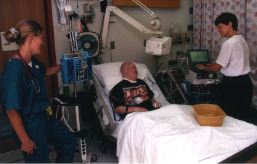|
Clinical Trials Overview
 It
is a large step from the laboratory to the clinic, particularly when it
comes to the discovery and testing of new cancer treatments. After extensive
laboratory research of a potential new cancer treatment, an Investigational
New Drug (IND) application is filed with the Food and Drug Administration(
FDA ). Following FDA approval, the three phases of clinical trials may
begin. As there are significantly more adults with cancer than children,
Phase 1 testing is usually begun in adult patients. After initial information
is gathered on a new drug's safety, Phase 1 testing may begin in children
with cancer. Clinical protocols are designed by experts in various fields
of cancer therapy and then reviewed by an independent group of people
who comprise the Institutional Review Board (IRB). Every medical center
performing clinical trials must have an IRB, which reviews the protocol
and approves its design before the clinical trial can begin. It
is a large step from the laboratory to the clinic, particularly when it
comes to the discovery and testing of new cancer treatments. After extensive
laboratory research of a potential new cancer treatment, an Investigational
New Drug (IND) application is filed with the Food and Drug Administration(
FDA ). Following FDA approval, the three phases of clinical trials may
begin. As there are significantly more adults with cancer than children,
Phase 1 testing is usually begun in adult patients. After initial information
is gathered on a new drug's safety, Phase 1 testing may begin in children
with cancer. Clinical protocols are designed by experts in various fields
of cancer therapy and then reviewed by an independent group of people
who comprise the Institutional Review Board (IRB). Every medical center
performing clinical trials must have an IRB, which reviews the protocol
and approves its design before the clinical trial can begin.
Phase 1 Trials
The primary objectives of a Phase 1 trial are to determine the optimal
dose of an experimental drug (or a standard drug which is being administered
in a new way), the behavior of the drug in the human body and the side
effects or toxicities. The optimum dose is usually the maximum dose which
can be administered. Phase 1 trials are for patients with cancer that
no longer responsive to standard treatment. In a Phase 1 trial, small
groups of patients are treated with the same dose of a new drug. Based
on how the patients tolerate the drug, small adjustments are then made
in dose and administered to another group of patients. The dose is usually
increased, but in some instances, the dose may have to be lowered. For
pediatric Phase 1 trials, patients are treated with doses that are close
to the dose recommended for further testing in children with cancer (Phase
2 trial). Children treated on a Phase 1 study continue to receive the
experimental drug only if the drug is helping the child. If the child's
tumor continues to grow, Pediatric Oncology Branch physicians then meet
with the family to discuss what other therapeutic options are available.
Phase 2 Trials
Following completion of the Phase 1 trial, the new drug is then tested
in Phase 2 trials, which test the ability of the drug or combination of
drugs to produce measurable tumor shrinkage. In a Phase 2 trial, groups
of 14 to 30 patients with the same type of tumor are treated with the
new drug. As for Phase 1 trials, only children with cancers that are no
longer responding to standard treatment are eligible for treatment on
a Phase 2 trial.
Phase 3 Trials
Phase 3 trials compare two or more treatments for a particular kind of
cancer. Typically an experimental treatment is compared to a standard
treatment, although in some cases two standard treatments or two promising
new treatments may be compared. The objective is to see if the new treatment
produces better results than standard treatments. Phase 3 trials are normally
randomized, meaning that patients are randomly assigned to either one
or the other treatment. Phase 3 trials have more patients than Phase 1
or 2 trials, often hundreds or sometimes thousands. Phase 3 trials are
performed cooperatively by a large number of medical centers across the
country. For children with cancer, there is the Children's Oncology group
in the United States. The Pediatric Oncology Branch of the NCI usually
does not perform Phase 3 testing, but does perform smaller clinical trials
termed "pilot trials" that incorporate the latest information
from laboratory and clinical trials into a new protocol. These pilot trials
may then form the basis for the design of future cooperative group Phase
3 trials.
Last Updated:July
26, 2006
NCI
Home Page|| NIH Home Page
© 2002-2003, Pediatric Oncology Branch, Center for Cancer Research,
National Cancer Institute
|